- Home
- Joy Dettman
Yesterday's Dust Page 3
Yesterday's Dust Read online
Page 3
In the fading light the fallen priest was his father’s image, the build, the colouring, the fine classic features. But not the mannerisms, stance or personality. John was a loner, nursing some deep guilt. Malcolm had on occasions made the effort to be neighbourly, to walk across the narrow road, but the ex-priest had little to say, and not once had he knocked on Malcolm’s door.
‘Too much of the mother in him. A victim born,’ Malcolm admitted, aware that he was wasting his time attempting to create characters from the characterless. The binoculars placed down, he glanced at his bottle. Still empty. He’d have to get out, fill it before dark. His vision was not good for night driving. He lifted the large bottle, loving its form.
‘Our game has ended, Coll. Perhaps we must face it together. It was a killer on the bones, and the hands are not as supple as of old. Perhaps we should retire. Travel the world. Enjoy our fame.’
His study walls were covered with framed book covers and other memorabilia. Few came to his house, and none, other than Ann, entered his study. It was a chaos of papers and pages, of stockpiled used brown envelopes he could not bring himself to toss away. Wall to ceiling bookshelves were packed with copies of his novels, supplied free by his publishers. He couldn’t give them away, and thus give up his secret; he couldn’t throw them away because he loved every one of them. And he wanted Number 10 to sit beside them.
He glanced up at the stacks of rubber-banded pages piled on the top shelf – early drafts of each of his novels. Six drafts of his first. He couldn’t throw them away either.
‘But out of chaos comes creation,’ he said, picking up a page of text, his day’s work, scanning it before tossing it high. The bottle upended, he squeezed it. A few drops dripped into his glass. Primed then, he sagged down to his writing chair, his finger prodding at a D for the damned. It led to an E.
Deeetermined to knooow the truth, Edward asked quuuestions others shrank from asking, but on thiiiis particular evening as he watched the guilty pair he wishhhhed he was close enough to hear, or that his ssssight was goood enoughhh to lip rrrread . . .
the facts of the matter
Tuesday 1 April
‘Let the rain pour down, and wash my face, let the sky grow grey and dre-aa-ry,’ Jeff Rowan, the local lawman, sang as he showered. Every landowner within a fifty-kilometre radius was singing the same old song; clouds had gathered late last night, and this morning the scent of rain was on the wind.
‘Oh, tell the sun, I don’t want it to shine, for you’ve gone away, and left me tea-aa-ry.’
Jeff had the perfect nasal tones for country and western; what he lacked was an ear for music.
The water turned off, he stepped out. ‘But not necessarily until tonight,’ he said. ‘Rain today will make the job that much bloody harder.’ He towelled his hair, eyed his shoulders and waist in the small bathroom mirror. Not bad. No beer belly yet. He bent his knees and checked out his face. False teeth but plenty of hair. Not too tall, but tall enough. Still young enough.
‘So what’s wrong with her?’ he said.
Jeff yearned for Kerrie Fogarty, the lanky infant mistress. He dreamt of her, but his dreams were better than his reality. She wasn’t interested. Still, that wasn’t the business of today. He dressed, donned his hat and boots, which gained him extra inches, then he headed for the river.
Amy O’Rouke had last been sighted on Thursday 27 March, wandering up the highway in her high-heeled sandals. Those eager to get away usually took the morning bus. Jeff had been considering his options for days now, but when Amy O’Rouke hadn’t checked in with her mother by the following Monday, he decided he probably ought to drag the river. A dragging crew had been organised to do it this morning which was, incidentally, April Fools’ Day.
He’d concentrate the search in the area below the bridge where one of his colleagues had pulled out another teacher’s wife, old Malcolm Fletcher’s wife, Jillian; she’d gone for the long dive thirty-odd years ago.
Teachers’ wives didn’t do well in Mallawindy, and that was a fact. One had taken off with a landowner and left her kids behind, another had just taken off, and now Amy O’Rouke, only in town a few months, had gone missing – probably topped herself, and who’d blame her?
Jeff had spoken to little Norman, the husband, and he’d had a word to the Indian doctor who visited the town one day a week. ‘Menopausal,’ the doctor had said. ‘She is suffering from the deep depression. I am prescribing the HRT, Valium and antidepressant.’ Norman had been less help; since his wife’s disappearance he’d been swallowing her pills and not following the directions on the packets. Today he looked as if the hormones were starting to kick in.
‘You can’t do much good down here, Norm. Go home,’ Jeff Rowan yelled, sighting the husband, knee deep in reeds.
Norman nodded, wiped at his eyes with a floral handkerchief and wandered deeper into the reeds, half in, half out of the water. Probably end up dragging him out tonight. Bloody Education Department had been scraping the bottom of the barrel when they dug up Norman and Amy O’Rouke, Jeff thought.
Kerrie Fogarty was trying to hold the fort, and Jeff was giving her what support he could. He would have loved to give her a bit more too – like he’d dreamt last night. She wasn’t having any. Not getting any from anyone else in town either. She was no kid fresh out of teachers’ college – had to be thirty-odd – probably been around the block a few times. The question in town was, had she been around it with a bloke or a lezzo.
‘They’re a bloody weird mob, teachers,’ he said.
By nine-thirty he had two motorboat crews armed with grappling hooks, two rowboat crews prodding with oars and poles, and half a dozen walkers poking around tree roots and snags.
One of the boat crews thought they’d found the missing Amy at ten, but it turned out to be a dead pig, minus its legs. Somebody was eating free pork this week – Ellie Burton’s pork; it still had her label on its ear.
With no sign of a yellow dress or yellow sandals found in the vicinity of the bridge, by late afternoon the boat crews had worked their way downstream, down past the Burton property where they scoured the reed banks, prodding mud and catching their grappling hooks on snags and willow roots.
Then they found it!
If not for an errant teacher’s wife, Jack Burton’s double-barrelled shotgun may have rested a hundred years in the mud.
It was old Bill Dooley who reeled it in. He hooked the trigger and, open-mouthed, watched his catch surface.
‘Hey. I’ve got his bloody gun,’ he yelled. ‘Hey! I’ve fished out Jack’s bloody old gun.’
‘Hey, Dooley has found Jack’s shotgun!’ The call went out across the water, and weary searchers gathered on the bank for a smoko and to talk again of Jack and his insurance policy, while an old cow, trimming the fringe of the trailing willow tree in the tradition of her ancestors, stopped her labour a while. She stepped two paces into the water and turned an ear, the better to hear.
‘Hey, Bessy. I pulled out his bloody old gun!’ Dooley bellowed across the river to Bessy Bishop, sister of Ellie. ‘He’s blown his brains out, the poor bastard.’
And the cow lifted her head and she lowed out her message to the herd.
‘Gone. Gone. Jack is gone.’
And Ellie’s hens, scratching in the old fowl yard, heard her; they cluck-clucked and gossiped amongst themselves, and the rooster crowed.
‘Jack-has-gone-to-hell. Jack-has-gone-to-hell.’
Across the river Bessy Bishop’s dogs heard the call, and they howled to the ghost of the sun. ‘Jack, Jack, Jack’s gone. Jack, Jack, Jack’s gone.’
All night the dogs of Mallawindy barked, and the cats wailed, and the rabbits courted and cavorted on the sand dunes out at Dead Man’s Lane, but it was business as usual in the Central Hotel.
‘It was finding his kid’s bones that done it, pushed him over the edge. Didn’t I always say it? Didn’t I? Finding young Liza murdered, like they did. I mean, on his own bloody brother’s pro
perty too. How are you gunna feel about that? How are you gunna live with that? He couldn’t, the poor bastard. Blew himself to buggery. I bet you a dime to a dollar.’
‘That’s what must of done it, all right,’ Mick Bourke, the publican agreed.
‘When?’ Henry Cooper, a recent blow-in, needed more details. Few in the bar had much time for blow-ins, except for a wizened-up old dame seated in her corner.
‘Back in late 1990, it was, boy. His daughter – missing for twenty-odd years, she was – then they dug her up on his twin brother’s property in Narrawee. Raped and murdered by the gardener, then buried under a rose bush while her little sister looked on.’
‘Yeah!’ Henry turned to Granny Bourke, busy lubricating her ninety-nine-year-old vocal cords with the stout she’d been drinking for seventy years, on doctor’s advice.
‘He had a tribe of kids, but he loved the one that got murdered. Took her everywhere with him, he did. Used to dress her up like a little princess. She won Miss Tiny Tot, you know, back in . . . back in ’63. I remember when it happened.’
‘Go down to the back, Gran,’ Mick Bourke yelled.
‘I’ll go when I get my second stout, boy, and you remember who owns this hotel, and shut up. I’m talking here.’
‘We can all bloody hear you talking. Go down the back and I’ll give you your other stout.’ Young Mick had inherited the management of the hotel from old Mick, but unlike his father he had never learned to manage Granny.
‘I’ll get it myself when I’m ready. That way I’m sure of getting it. You’re too mean to spit, you are. You’re getting too much like your bleedin’ father.’
‘You tell him, Gran,’ many voices chorused.
Loud in the bar tonight. Like a flock of gaggling geese the drinkers competed for their time, and when they left the hotel, the news spilled out to the street corner.
‘Did you hear they found Jack’s gun?’
‘Never would o’ believed it of him. Never thought he’d be the type to blow his brains out.’
‘Something snapped, they say, when they dug up his kid. That’s what they reckon at the pub. We all got our snapping point.’
‘I seen him in the pub the night it happened. He didn’t look much different to me.’
‘Snapped when he got home. Went off his rocker, they say.’
‘Him and Charlie Owen were going at it hammer and tongs that night.’
‘Jack and Charlie’s missus had been going at it for five bloody years.’
Laughter on street corners as they watched a stranger’s car drive into town, park.
‘Looks like that insurance bloke’s car again.’
‘Or those bloody news hounds back. Doesn’t take them long to sniff out a story, does it?’
The following day the men in boats forgot about Amy O’Rouke and began searching for Jack, or for what might be left of him, which wouldn’t be too much after the shotgun had done its worst and the European carp and yabbies had had his bones to nibble on for six years.
For days fish played around the grappling hooks, darting, diving, knowing more than the men in the boats. They blew chuckle bubbles while the river flowed on through this red and grey land, and the clouds, refusing to mourn Jack’s demise, moved away to drop their payload on a more deserving town.
The frogmen came then, came all the way from Sydney, and for another week they suited up and scoured the muddy water while the unemployed lined the riverbanks watching, waiting. And the newsmen came, their cameras aimed and ready.
No Jack Burton. No Amy O’Rouke either. By April’s end, the little schoolmaster had returned to his classroom, where he stared into space while the students stared at him.
the party
So time moved on in Mallawindy, and the pages of the ‘Burton & Dooley’ calendars were turned, offering a photograph of twin calves for the flies to defile. May came in hot and left without a drink, then June arrived, a T-shirt June by day, but each night she spun her carpet of glistening ice over the bone-dry paddocks and the farmers cursed the blue sky and their dry dams; they bought hay for their stock and they waited.
By late July, all hope of rain was dead, but old Granny Bourke, born on 19 July 1897, had no intention of dying and wasn’t too worried about the drought either. She was planning her hundredth birthday party.
‘Only fifty guests, Gran,’ her aging daughter-in-law stressed.
‘I’ve got more than fifty bleedin’ relatives.’
‘Fifty, Gran. No more.’
Gran could, by tracing a line back far enough, claim relationship to most Mallawindy residents. Supplied with only fifty invitations, she found a way around the problem. Milly and Joe Crocker and family. Bessy Bishop and family. Ellie Burton and family. Jim Watson and family. She received few refusals.
Ellie coerced Bronwyn. Bronwyn coerced Ann. Ben said he’d pop in for a while, but Johnny said no.
The party was held in the residence at the rear of the hotel but the hundred and fifty guests spilled out to beer garden and bar, to ladies lounge and pool room. The marble clock on the mantelpiece had ticked its way to three-thirty. The cake long cut and demolished, the Daree Gazette photographer been and gone, still the old dame wasn’t ready to give up her spot of limelight, though her legs were. Expecting the party now to come to her, she settled into her favourite chair, from where she could keep an eye on that clock.
‘I say. I say, take Jillian Fletcher as an example,’ she yelled. Didn’t get any takers but she got a cigarette out, and lit it, singeing her sparse hair in the doing.
Few in town made it to eighty with their faculties intact. Old Gran may have had the body of a smoked goanna, but she possessed the memory of a rogue elephant and the logic of a city bean-counter. She had been living behind the hotel since her wedding night in 1914, ingesting nicotine, stout and the town’s secrets on a daily basis.
‘I say, take Jillian Fletcher.’ A dogged old bird, she persisted, determined to capture a listener.
Bronwyn Burton heard her, but kept her distance. She wasn’t feeling sociable today so she leaned against the wall, watching people, watching Ann, who stood by the window with Jeff Rowan, Kerrie and Ben. Ben was five-seven. Kerrie and Jeff stood eye to eye with him, but Ann, her hair pinned high, was half a head taller. Easy to find Ann in a crowd. Still thin as a rake handle; she could wear loose jeans and bulky sweaters and still look slim. Bronwyn looked at her own jutting breasts; she had inherited Ellie’s buxom build and never, never, never wore bulky sweaters.
Two women joined the group. Bronwyn smiled, watching Ben evade Judy Watson’s greeting kiss. Ann copped the kiss and she flashed her smile. Bronwyn envied her sister the strong teeth she’d inherited from their father. She had his determined jaw too, but not his eyes; still wide, still more black than brown in the cold afternoon light, still wanting to run, to get away – if only Bronwyn knew it.
Ann wasn’t into fake kisses, though these days few would guess; she put on her party face with her make-up, carried her party manners in her shoulder bag. She’d strip them off, toss them onto the back seat as soon as she slid behind the steering wheel for the drive home.
Both Burton girls had their father’s long hands. Bronwyn looked at her own now. No rings. Didn’t want any either. Ann wore three; David had bought her an eternity ring for their fifth anniversary, wanting to lock the engagement and wedding ring more firmly onto her finger. They’d had a few bad years after Mandy’s death, but he’d hung in there. He was a nice guy, more brother than in-law, an accepting guy and easy to be with, to talk to. But he wasn’t here today and Bronwyn didn’t feel like talking anyway.
Then Ann turned her head, her eyes scanning until she found her sister. Her hands high, she signed, ‘Had enough.’ For seven years she’d communicated with hand signs, and they were still put to good use in crowded rooms. ‘Want go?’ the hands asked.
‘What you think?’ Bronwyn’s hands replied. Fast. Emphatic. God only knew why she’d agreed to put in an appearance. G
od alone knew why she did anything these days.
Her bag over her shoulder, she walked to the door, waiting there for Ann to make her break for freedom, and she was halfway across the room, too, when Bessy bailed her up. Bronwyn moaned, took a cigarette from her bag and lit up.
The ash grew long, longer. Outside in the biting wind wasn’t an option. She was forced to walk to old Gran’s side, or to her standard ashtray.
Granny squinted at her guest, measuring her up before offering a running commentary on their old connections.
‘. . . anyway, when the bleeding war got my Jimmy, Katie, your great aunt on your grandma’s side went into mourning and never came out of it. We buried her two years after the war ended. Blow-ins, the Granvilles – they had no staying power. Look at your grandmother. She was dead at forty.’
Bronwyn nodded, wondered how much blow-in Granville blood she carried. The way she was feeling today, she probably wouldn’t make it to her thirty-first birthday. Sick and sore and sorry for herself, her world had been picked up and used as a bowling ball and she was one of the tenpins. Down.
She’d broken a front tooth in February. It had abscessed in March. Penicillin injected into her backside, penicillin by mouth before meals and some super bug killer to pop after meals, and not enough hours in a day to swallow what she had to swallow plus painkillers. She’d blown her cool when Jeff Rowan had pulled her up for speeding. Instead of flirting with him, as she had on previous occasions, she’d told him where to go, and where to put his ticket too. She’d blown her licence. That was in April. She’d told Nick where to go in May, told him to drop dead in June, and now it was July and things were looking worse.
The old dame drew hard on her cigarette, priming her brain for the next instalment of yesterday.
‘She took to her bed, you know, after she lost her last one, and she never got out of it again. Bessy raised your mother.’

 The Hope Flower
The Hope Flower Trails in the Dust
Trails in the Dust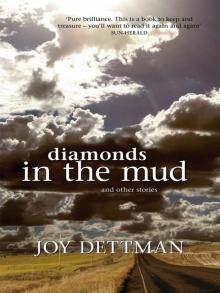 Diamonds in the Mud and Other Stories
Diamonds in the Mud and Other Stories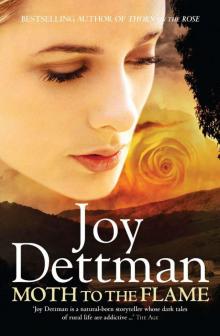 Moth to the Flame
Moth to the Flame The Tying of Threads
The Tying of Threads Wind in the Wires
Wind in the Wires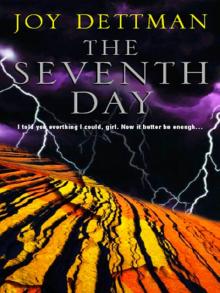 The Seventh Day
The Seventh Day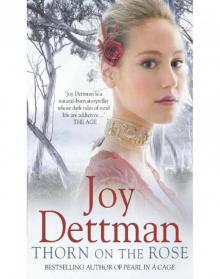 Thorn on the Rose
Thorn on the Rose Jacaranda Blue
Jacaranda Blue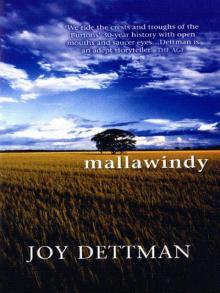 Mallawindy
Mallawindy Ripples on a Pond
Ripples on a Pond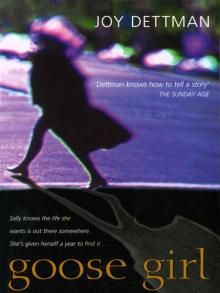 Goose Girl
Goose Girl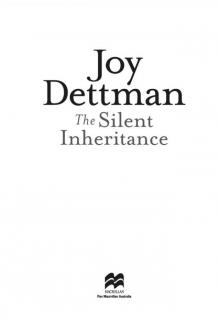 The Silent Inheritance
The Silent Inheritance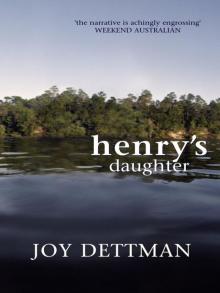 Henry’s Daughter
Henry’s Daughter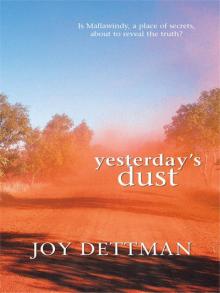 Yesterday's Dust
Yesterday's Dust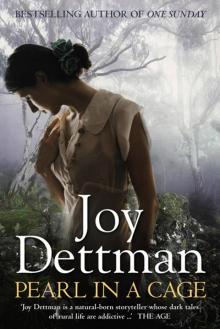 Pearl in a Cage
Pearl in a Cage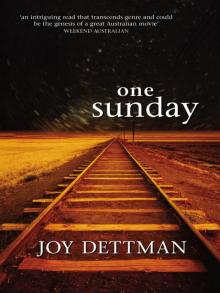 One Sunday
One Sunday